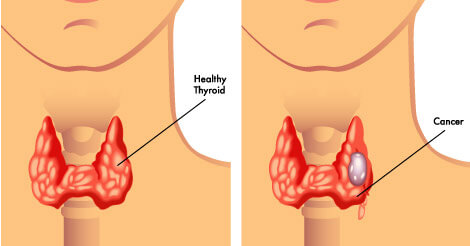The thyroid gland plays a crucial role in regulating various metabolic processes. It produces hormones that control the body’s metabolism, heart rate, temperature, and energy levels. When the thyroid gland malfunctions, it can cause a range of symptoms that affect the overall health and well-being of an individual. Thyroid disorders are prevalent, with an estimated 20 million Americans affected. In this blog, we will discuss five common symptoms of thyroid problems and how the TSH test can help diagnose and manage them.
Table of Contents
Overview of the Thyroid Gland and its Functions
The thyroid gland is a small, butterfly-shaped gland in the neck, just below the Adam’s apple. Despite its small size, it plays a crucial role in regulating various bodily functions.
The thyroid gland produces hormones, primarily thyroxine (T4) and triiodothyronine (T3), that help to regulate metabolism, growth, and development. These hormones control the rate at which the body uses energy and affects almost every organ.
The thyroid gland is controlled by the pituitary gland, a pea-sized gland located at the base of the brain. The pituitary gland produces thyroid-stimulating hormone (TSH), which stimulates the thyroid gland to produce more thyroid hormones when necessary.
The thyroid gland also produces calcitonin, a hormone that helps regulate the amount of calcium in the blood.
The thyroid gland plays a vital role in maintaining the body’s metabolism, growth, and development. Dysfunction of the thyroid gland can lead to various health problems, including weight changes, fatigue, and mood disorders.
TSH (Thyroid-Stimulating Hormone) Test in Pune: 9028566644
5 Common Symptoms of Thyroid Problems
Thyroid problems can cause various symptoms that affect overall health and well-being. Some of the most common symptoms include:
- Fatigue and weakness: Hypothyroidism, or an underactive thyroid, can cause fatigue, weakness, and lethargy. Individuals with an underactive thyroid may find it challenging to perform daily tasks and feel tired even after a good night’s sleep.
- Weight gain or loss: Weight changes are common symptoms of thyroid problems. Hypothyroidism can cause weight gain, while hyperthyroidism, or an overactive thyroid, can lead to weight loss.
- Mood changes: The thyroid gland plays a crucial role in regulating mood. Individuals with thyroid problems may experience changes in mood, including anxiety, depression, irritability, and mood swings.
- Hair loss and dry skin: Hair loss and dry skin are common symptoms of thyroid problems, particularly hypothyroidism. This is because the thyroid gland helps regulate skin and hair health by controlling the production of oils and other substances that keep the skin and hair healthy.
- Irregular menstrual cycles: The thyroid gland plays a crucial role in regulating reproductive hormones. Thyroid problems can cause irregular menstrual cycles, heavy periods, or missed periods.
Additional Symptoms associated with Thyroid Problems are:
- Changes in heart rate and blood pressure: The thyroid gland plays a crucial role in regulating heart rate and blood pressure. Thyroid problems can cause rapid or irregular heartbeats, high or low blood pressure, and other cardiovascular symptoms.
- Digestive problems: The thyroid gland also affects the digestive system. Individuals with thyroid problems may experience constipation, diarrhea, or other digestive issues.
Understanding the TSH Test
- What is TSH?
The TSH, or thyroid-stimulating hormone, is a hormone produced by the pituitary gland in the brain. It plays a crucial role in regulating the production of thyroid hormones. When the thyroid gland is not producing enough thyroid hormones, the pituitary gland releases more TSH to stimulate the thyroid gland to produce more hormones.
- How is the TSH test done?
The TSH test is a simple blood test that measures the level of TSH in the blood. It is a common test used to diagnose thyroid problems and monitor the effectiveness of thyroid treatments.
Also Read: Why People Trust On Us And Made Us Pune’s Most Trusted Diagnostic Lab?
How the TSH Test Helps Diagnose Thyroid Problems
The TSH test, or thyroid-stimulating hormone test, is a blood test that measures the amount of TSH in the bloodstream. TSH is a hormone produced by the pituitary gland in the brain that stimulates the thyroid gland to produce thyroid hormones. The TSH test is a crucial tool in diagnosing thyroid problems because it can indicate whether the thyroid gland is functioning properly.
There are two main types of thyroid problems: hypothyroidism and hyperthyroidism. In hypothyroidism, the thyroid gland does not produce enough thyroid hormone, leading to fatigue, weight gain, and depression. In hyperthyroidism, the thyroid gland produces too much thyroid hormone, leading to symptoms such as weight loss, anxiety, and rapid heartbeat.
The TSH test can help diagnose both hypothyroidism and hyperthyroidism. Here’s how:
- Hypothyroidism
When the thyroid gland does not produce enough thyroid hormone, the pituitary gland tries to compensate by producing more TSH. The extra TSH in the bloodstream signals the thyroid gland to produce more thyroid hormone. Therefore, in individuals with hypothyroidism, TSH levels are typically high.
A healthcare professional may perform the TSH test if an individual has symptoms of hypothyroidism, such as fatigue, weight gain, and depression. If the TSH level is high, the thyroid gland is not producing enough thyroid hormone. Additional tests, such as T4 and T3 levels, may also be performed to confirm the diagnosis and determine the severity of the condition.
- Hyperthyroidism
When the thyroid gland produces too much thyroid hormone, the pituitary gland reduces the amount of TSH it produces. Therefore, in individuals with hyperthyroidism, TSH levels are typically low.
A healthcare professional may perform the TSH test if an individual has symptoms of hyperthyroidism, such as weight loss, anxiety, and rapid heartbeat. If the TSH level is low, this indicates that the thyroid gland is producing too much thyroid hormone. Additional tests, such as T4 and T3 levels, may also be performed to confirm the diagnosis and determine the severity of the condition.
In addition to diagnosing thyroid problems, the TSH test can also help monitor the effectiveness of thyroid hormone replacement therapy in individuals with hypothyroidism. If an individual takes thyroid hormone replacement medication, the TSH level can be used to determine if the medication dosage needs to be adjusted.
Conclusion
Thyroid problems can cause various symptoms that affect overall health and well-being. Understanding the common symptoms of thyroid problems and the importance of the TSH test can help individuals diagnose and manage thyroid disorders. If you are experiencing any of the symptoms mentioned in this blog, it is essential to speak with a healthcare professional to determine if further testing is necessary. Early diagnosis and treatment of thyroid problems can help individuals maintain optimal health and prevent long-term complications.
For more information kindly visit our website: https://sunrisediagnosis.com/
Call Now: 9028801188, 9028566644, 9028566611
Find the clinic here: Get direction
Address: Ground Floor, Shop No. 2, Business Hub Building Opp. Mirch Masala Hotel, Near Vandevi Mandir Karve Road, Karvenagar, Kothrud, Pune, Maharashtra 411038







